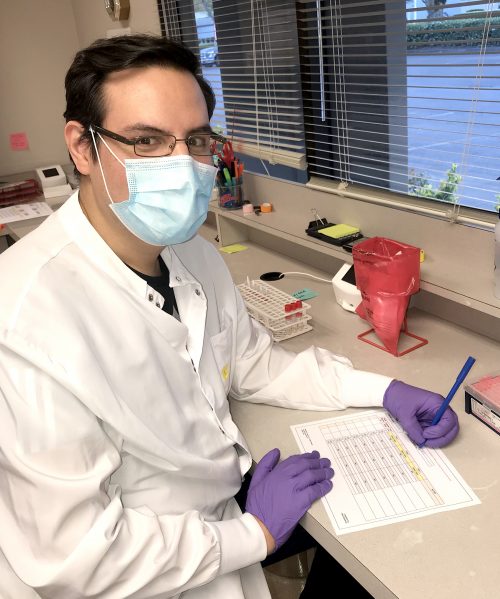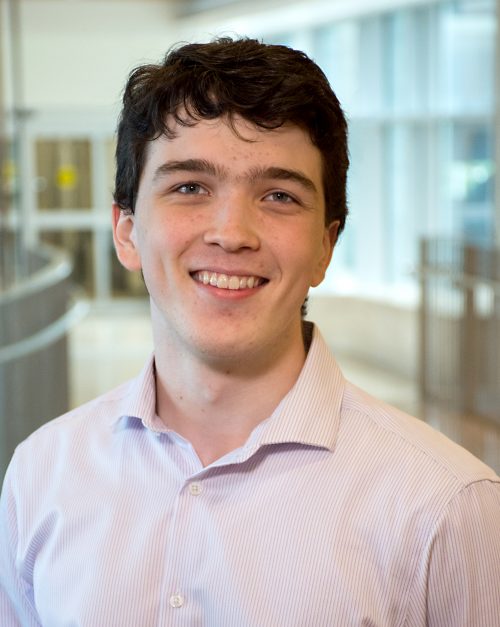This content was published: June 1, 2020. Phone numbers, email addresses, and other information may have changed.
In COVID-19 world, Bioscience Technology alumni find critical work experience
Photos and story by James Hill
Alex Sathler and David Chavez-Gonzalez had everything they wanted when they enrolled in Portland Community College’s Bioscience Technology Program. They were saving money with an affordable program, learning a field they were passionate about, and were developing the skills needed for rewarding careers.
But they had one problem – both men lacked work experience in the bioscience field.
“I found myself in a conundrum: I knew that in order for me to be successful getting jobs in research, I needed experience,” lamented Sathler.
Biosciences at PCC
- The Biosciences Technology Program is based at the Rock Creek Campus in Washington County.
- Courses combine theoretical and hands-on training with an emphasis on understanding, quality, accountability and communication.
- This broad and growing industry includes pharmaceuticals, diagnostics, medical devices, agriculture, energy, academic research, and more.
A few years ago, Chavez-Gonzalez had completed his bachelor’s degree in Micro/Molecular Biology at Portland State when he began looking for a job, but found that a lack of experience was a tall hurdle.
“It was my biggest concern,” remembered Chavez-Gonzalez. “With no experience in the science field, my chances of getting a science-related job were slim to none.”
But PCC’s Bioscience Tech Program had their proverbial backs.
The program offers students the chance to gain up to 1,000 hours of hands-on laboratory experience in preparation to work in pharmaceuticals, diagnostics, medical devices, academic research, and other bioscience fields. PCC faculty partner with a wide variety of local bioscience companies to provide guidance on the program’s curriculum and employment opportunities for students.
“I figured that I would receive the training and experience I needed to score some part-time jobs and internships in the biosciences,” Sathler added. “This way, I would be able to boost my resume while saving money at PCC.”
The companies that work with PCC are in need of skilled technicians in biomanufacturing, manufacturing technician, quality control technician and research. Hence, PCC collaborates with them to provide cooperative education opportunities like internships for students to gain work experience while earning degree credits.
“Opportunities in bioscience in Oregon have been growing for many years,” said Josh Cary, who serves as PCC’s Bio Tech Program faculty chair. “The demand for skilled technicians is increasing.”
As COVID-19 hit Oregon, the Bioscience Tech Program hasn’t slowed down. While in-person labs were cancelled this past spring term, the program has transitioned into a remote instruction format in order to assist students in job readiness and networking and provide elective training options like microbiology, technical writing and statistics.
Designated as an exempt and critical program by Gov. Kate Brown, Bioscience Technology is preparing to offer students technical training with appropriate social distancing and safety measures in the summer term and upcoming year.
This is critical because bioscience companies are on the frontlines fighting COVID-19 and need trained graduates to continue their work on COVID-related research and products. Cary said PCC’s Bio Tech Program offers students a way to get actively involved in helping to address the global pandemic.
The program has given Sathler and Chavez-Gonzalez the experience they needed. Sathler earned his associate degree in Bioscience Technology last year and is working on his bachelor’s degree in Biochemistry/Biophysics at Oregon State University. He obtained a prestigious Molecular Biophysics Internship at Princeton University this summer, but it was cancelled due to the pandemic.
Despite the challenges caused by the coronavirus, Sathler soldiers on and is looking at a local internship this summer. He still plans to join Princeton next year.
“The faculty in the program do their best to enable you to land a job in the bioscience industry,” Sathler said. “Without the lab skills, professionalism, and connections that I developed, I would not be where I am now.”
Chavez-Gonzalez also earned his associate degree and is now gaining that experience he once lacked. He is working as a Quality Control Laboratory Technician with Sedia Biosciences in Northeast Portland where he ensures the products they make function as intended.
“My work at Sedia is proving to be all that I hoped it would be,” he said. “Many of the skills that PCC gave me are now helping me succeed at work. I knew this program would help me get prepared for an excellent job.”


